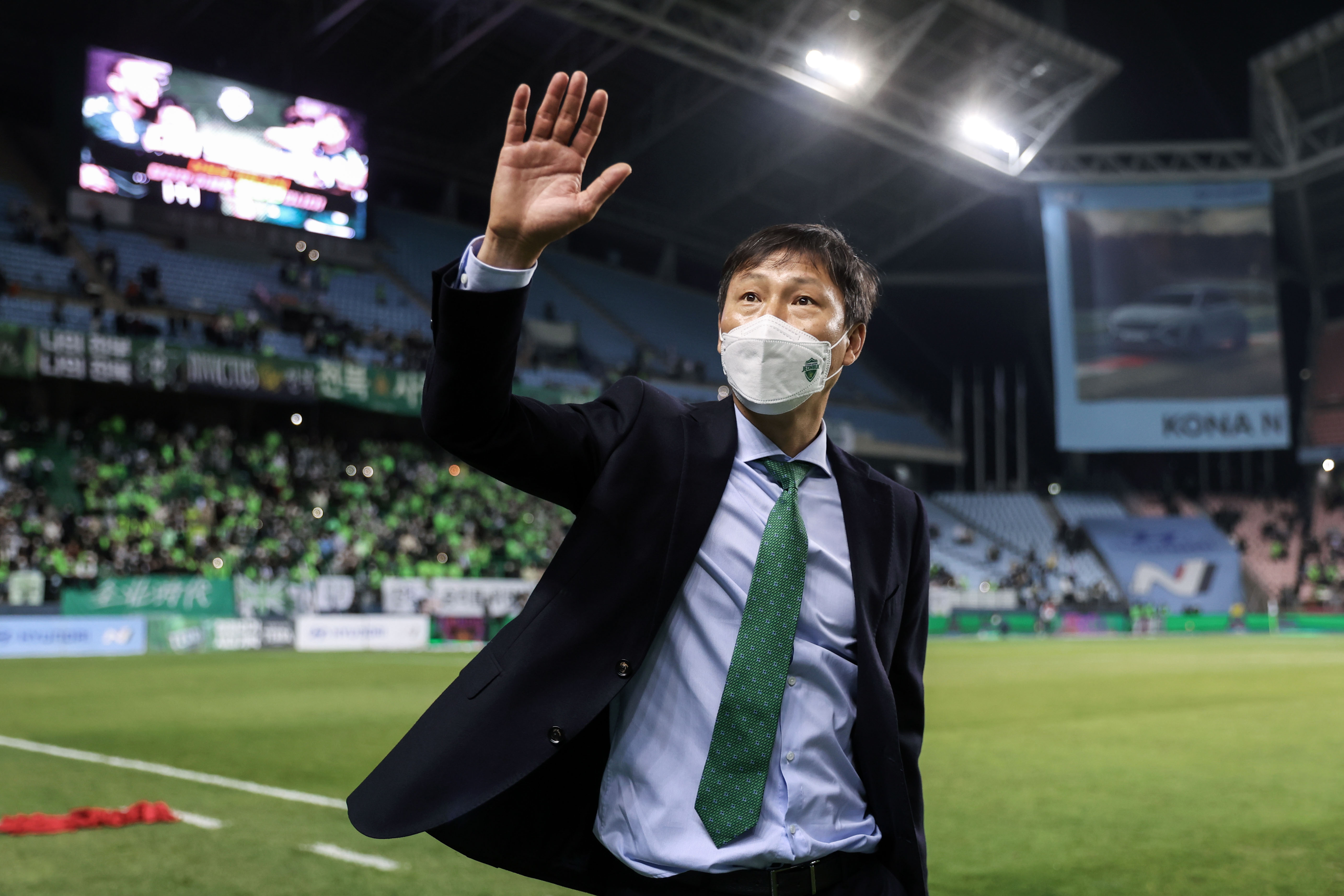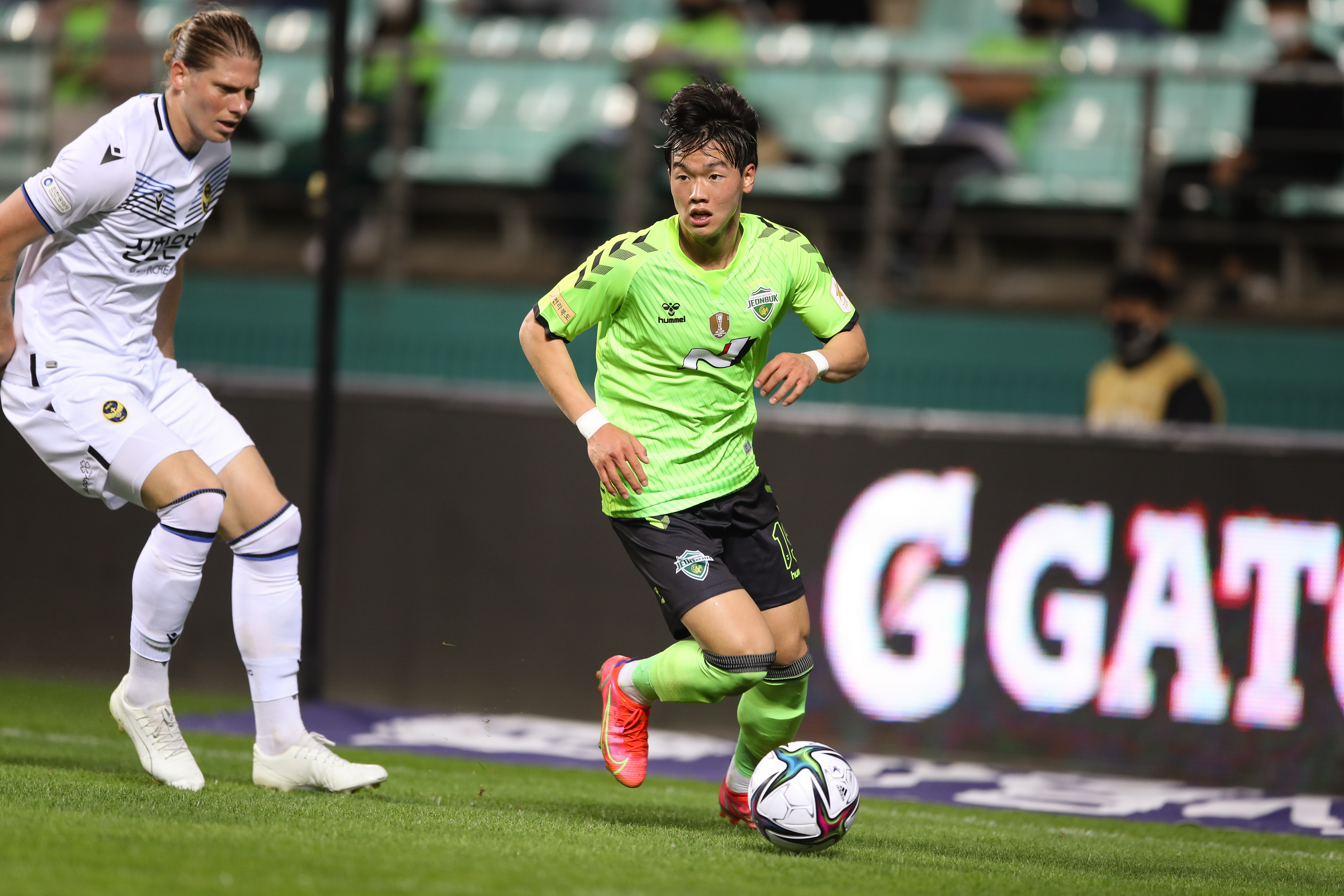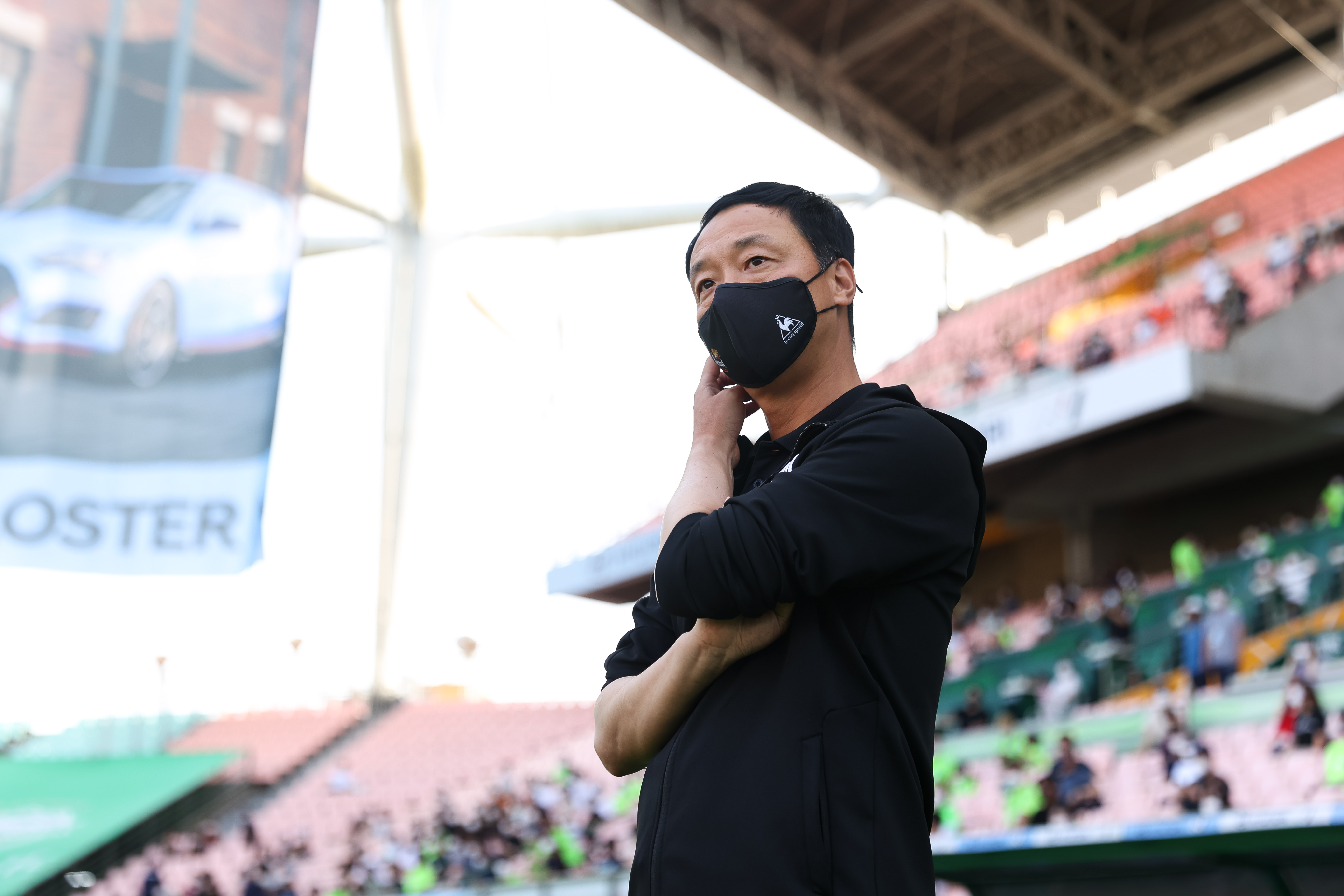The Under-22 Quota: The Challenge Facing Jeonbuk
For a club poised to claim silverware once more, one could be fooled into thinking that K League 1's reigning champions Jeonbuk Hyundai Motors have little to concern themselves with heading into the new campaign. With fewer players within their squad meeting the under-22 quota though, while also not meeting or exceeding the level of the senior players vying for the same positions, manager Kim Sang-sik faces the challenge of bringing through the next generation while keeping his squad happy. K League United's Editor-in-Chief Matthew Binns looks at this dilemma facing the Green Warriors and how they are looking to address it.
A glance at the engravings on the base of the K League 1 trophy would suggest that 2021 was like any other season for Jeonbuk as they claimed both a recording-extending ninth title and fifth in a row, with manager Kim Sang-sik being awarded the K League's Manager of the Year award for his efforts as a result. However, while his achievements of holding an exciting Ulsan side at bay to earn silverware in his first season as a manager is certainly deserving of praise, 2021 also highlighted Jeonbuk's most glaring deficiency and the challenge they face going forward: the notable gap between their youth and senior players.
Now, this is not to say Kim has failed to bring younger players into the squad nor that he doesn't believe in younger talent, having freshened up the midfield and notably reduced the average age of the squad through signings and switches in personnel into a team that now looks set to maintain dominance in the next few years. The issue facing Kim is that of the K League's youth quota, or more specifically, the lack of required players under the age of 22 which the manager must trust with first-team responsibilities.
While the K League has maintained some form of youth quota for the previous six seasons, last year's campaign saw the Under-22 rule further complicated with the added option of five substitutions. In short, in order to utilise all five substitutions in a match, at least one player born after 1st January 2000 should be fielded in the starting eleven while one more U22 player should feature at some point during the game (either also from the start or from the bench). Failure to do so would mean a reduced number of substitutes.
[READ: The Five Substitutions Rule]
The quota was intended to ensure ample opportunities were provided to young players while the introduction of five substitutes was to help squads during a compact schedule affected greatly by the ongoing COVID-19 pandemic. Despite this, multiple managers across the top flight found the best way to circumvent this rule was to start a young player for fifteen to twenty minutes before removing them from play, ultimately abiding by the rule but not implementing it in the spirit it was intended.
Jeonbuk were no exception to this, with manager Kim Sang-sik regularly choosing to take players off early after starting them. Kim even went so far as to give just the first eight minutes of play in each of the last two games to Lee Sung-yoon before removing him from proceedings, underscoring how little faith was held in the club's young talent during the title-deciding matches.
The club even splashed out in the summer window on 2020's Young Player of the Year, Pohang Steelers' Song Min-kyu. Song had just six months left as a U22 player at the time, fulfilling the quota for the title run-in. For a team that once relied on entrusting youngsters in the past for whole matches to win titles such as Kwoun Sun-tae, Lee Jae-sung, Jang Yun-ho, Kim Min-jae and current goalkeeper Song Beom-keum, the current situation is a damning indictment of where things now stand for the Champions.
While there were other managers who conducted themselves in similar ways, the situation served to highlight the widening chasm between Jeonbuk's U22 players and the rest of the squad. For a team with considerable resources, its failure to bring through its own talent is becoming increasingly notable and somewhat embarrassing. Not only that, but with title rivals Ulsan Hyundai, plus sides such as Suwon Samsung Bluewings and Pohang Steelers, all producing a wealth of young players that could make many K League teams on merit regardless of the quota, it suggests there is a problem lurking in Jeonju that could prove to be a challenge for Kim's managerial reign moving forward.
[PATREON: K League 1 U22 Player Quota Candidates]
With Song Min-kyu no longer an eligible U22 player, and the recent departure of Choi Hee-won to Seongnam and Lee Sung-yoon on loan to Seoul E-Land, young players with playing experience are becoming increasingly rare within the ranks.
Those that have stayed find their path to the first team blocked by multiple regulars in each position that would command a starting spot in most K League sides. 20-Year-old defender Park Jin-seong made eleven league appearances in 2021 and would have been forgiven for being encouraged by the departures of left-backs Lee Ju-yong and Sasalak Haiprakhon. However, he still needs to be selected above Korean international Kim Jin-su and club-legend Choi Chul-soon. Park may well have at least been buoyed by recent reports of Jeonbuk transfer target Kang Sang-woo setting his sights on Beijing though rather than the well-trodden path leading from the Steel Yard to Jeonju Castle.
19-year-old winger Lee Ji-hoon also made a number of appearances last season and could be hoping for more in the upcoming campaign. The youngster made 17 appearances, averaging approximately 32 minutes per game, although with 16 of those being starts, Lee also found himself regularly being removed early from the action. Lee's path to the first team is also somewhat obstructed with wingers Song Min-kyu, Han Kyo-won, Modou Barrow and Moon Seon-min preferred choices. With manager Kim Sang-sik seemingly preferring to start his U22 player on the wings though, Lee still has the best chance of minutes this season.
One other U22 player who oddly saw minutes in a bid to keep with the quota was goalkeeper Kim Joon-hong, not to be confused with U22 goalkeeper Kim Jeong-hoon who featured at the start of last season for Jeonbuk in a similar vein before undertaking his national service early. With the need for two U22 players to have graced the pitch for all five substitutes to be used, both found themselves being subbed on late for starting goalkeeper Song Beom-keun as substitute number four to allow a senior player to then come on as the fifth replacement. Kim Joon-hong's semi-professional contract has been upgraded in the winter as he looks set to get regular minutes in Jeonbuk's newly launched B team.
And herein lies Jeonbuk's proposed solution to their youth problem; the controversial B team. 2021 saw K League and KFA allow for teams from K Leagues 1 and 2 to field a B team in the semi-professional K4 League in order to help further develop talent with more competitive playing time.
Gangwon were initially the only team to take up the option, and with the senior side flirting so closely with relegation it could be argued it perhaps did not have the desired short-term effect their board may have been hoping for. However, despite the late season decision to reestablish the reserve league in 2022 after its pandemic-related suspension for the previous two years, this year now sees Jeonbuk, FC Seoul, Daegu and Daejeon Hana Citizen putting forward their backup teams as they look to give their larger squads an opportunity to compete.
Perhaps also aware of this widening chasm between the youth and seniors squads, the club have taken up this option and approached it seriously, employing the services of former Gwangju and FC Seoul manager Park Jin-sub (pictured below) to helm the side along with his favoured assistant from those clubs, Yoo Kyung-ryul. While Park's tenure with the capital club may have ended somewhat disastrously last year, his work with Gwangju and his reliance on young players such as Um Won-sang to finish in the top flight's top six in 2020 still deserves recognition. Park, with perhaps an eye on restoring that reputation, will undoubtedly be looking to prove his worth by successfully bringing through the next generation for the Champions.
The club have also used this as an opportunity to significantly increase their youth intake, initially offering 11 professional contracts to youth players for the season ahead in what is the club's largest youth recruitment since 2003. While the aforementioned Kim Joon-hong and also 18-year-old midfielder Park Chae-hoon were already training with the senior side last year on semi-professional contracts, the other nine also have shown potential and have been a part of the youth side that won the 2021 High School Football League King of Kings, 2020 President's Cup and 2019 KFA President's Cup. The club since signed four more youngsters after they impressed on trial at pre-season training in Mokpo. The B team is considered the next step in their journey for all of these prospects.
🖋 Jeonbuk sign 11 youth players onto contracts for the upcoming season. It is their biggest intake since 2003 and comes ahead of the club launching its B Team in K4 League this year managed by former Gwangju & Seoul boss Park Jin-sub.#KLeague | #K리그 | #JEO🟢 pic.twitter.com/bwt3Q1vDtP
— Matthew Binns (@Matt_Binns) January 7, 2022
Jeonbuk sign 4 more rookies after good showings at the Mokpo training camp. They're set to feature in Jeonbuk's B Team.
— Matthew Binns (@Matt_Binns) February 8, 2022
DF Lee Sung-min (Yongin Uni)
DF Park Sung-hyun (Alemannia Aachen - German 4th tier),
MF Kim Tae-hyun (Dankook Uni)
FW Park Kyu-min (Gwangju Uni)#KLeague pic.twitter.com/vPOaP8YQos
With K League also reportedly allowing players to move between the first team and reserve sides outside of the registration window this year, any youth player who does start to shine in the fourth tier will undoubtedly catch the eye of Kim Sang-sik, especially given the lack of options he has at present within the senior squad.
However, while the B team does seem to offer a potential solution to Jeonbuk's U22 problem in the longer term, it still does not address the issue of offering these players significant minutes in the senior side this season. Ideally, the opportunity the B team provides will see the rise of younger talent able to establish themselves in the squad on merit and reduce Jeonbuk's overreliance on signing players. However, for now, evidence would suggest any player from here making the step up to the senior side could only be doing so for short cameo appearances.
There is also still time in the transfer window for Jeonbuk to move in for a U22 player deemed worthy of regular first-team minutes in a bid to paper over the cracks once more but, and perhaps correctly, there seems to be little interest in doing so with focus being on selecting the young talent from the current pool now at the club.
Finally, there is also the argument that this whole issue is not actually a problem at all. With the talent Jeonbuk possess and the sway they have in the market, manager Kim Sang-sik can possibly continue to circumvent this rule in the manner he has been doing and still achieve success without repercussion. Meanwhile, their youth players will obtain regular minutes in the competitive fourth tier and continue to make appearances in the top tier for a Championship-challenging side, undoubtedly giving the club sellable assets for the future at the very least and, at most, Korea's next bright hopeful.
There is something about having talent also come through the ranks that is endearing to supporters though. For a fanbase that probably could not wish for more, having these players entrusted and developed while sporting the side's synonymous green jersey may also prove endearing and something to point out with pride.
Furthermore, recent Korean National Teams have featured fewer and fewer talents from Jeonju, while the clubs around them are bringing through exciting young prospects sought after by European sides and subsequently the larger transfer fees that come with it. All of these funds can then be reinvested into developing those teams further, bringing the legacy of Jeonbuk into question. Jeonbuk are one of the most successful and dominant clubs in K League history, not to mention a continued force to be reckoned with on the continent, but they now need to prove they are also able to develop players in-house just as well if they are to keep their rivals at bay.










![[about]](https://blogger.googleusercontent.com/img/b/R29vZ2xl/AVvXsEh0mXcKy7h0fXIgdvWFm5DpFfwXkPr2ggzUt9_AoPo8vS0HOsFMT8KsO21qTLZBKoLyQXSOAckzy4OtJCPOoHtL5cGqAa0zXKzIdiW45D6TCFAisfJUODssBTfrkat95GXhJc8haWSP3nyV/s1600/KLU.png)
No comments:
Post a Comment